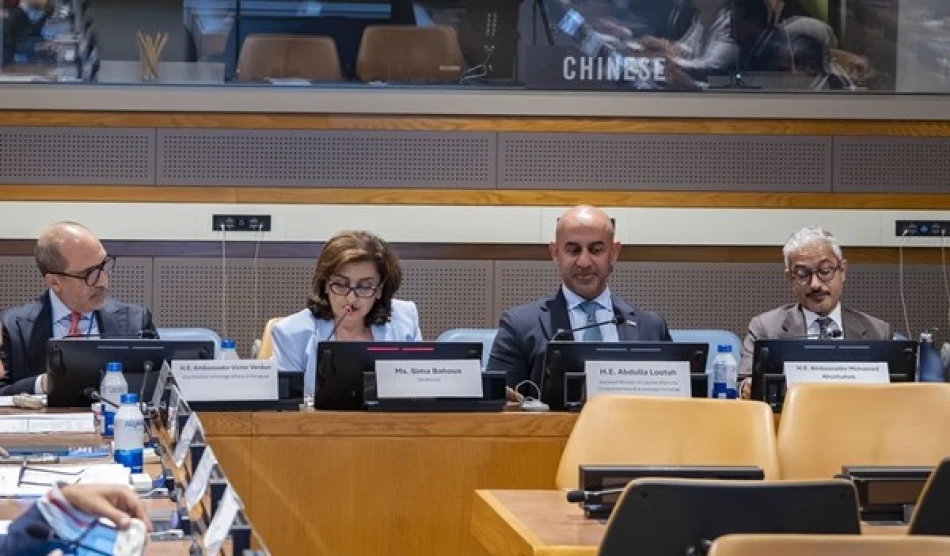
UAE Unveils Ambitious 2045 Sustainable Development Goals Report at UN
UAE Positions Itself as Global Leader in Post-2030 Development Planning with Bold 2045 Vision
The United Arab Emirates has launched an ambitious roadmap for global sustainable development beyond 2030, unveiling its "2045 Sustainable Development Goals Report" at the United Nations headquarters in New York. The initiative, backed by a comprehensive global survey spanning 55 countries, positions the UAE as a strategic architect of the next generation of international development frameworks—three years ahead of official UN discussions scheduled for 2027.
Strategic First-Mover Advantage in Global Development Planning
The UAE's early engagement in post-2030 development planning represents a calculated diplomatic and economic strategy. While the UN won't formally begin discussions on successor goals until 2027, the Emirates has been quietly building consensus since 2023 through its "SDGs in Implementation Forum" at the World Government Summit in Dubai.
Abdullah Nasser Lootah, Assistant Minister for Cabinet Affairs for Competitiveness and Knowledge Exchange, emphasized the UAE's proactive approach: "The UAE seeks to achieve early international consensus on the 2045 sustainable development goals, building on experiences and lessons learned from the 2030 goals to ensure a more sustainable and equitable future for all communities."
Building International Coalition Through Knowledge Leadership
The Emirates has already convened over 170 global leaders through its annual forum, creating a de facto think tank for future development priorities. This approach mirrors Singapore's strategy of positioning itself as a regional hub through thought leadership, but on a global scale focused on sustainable development rather than financial services.
Data-Driven Vision Challenges Traditional Development Models
The UAE's global survey, involving participants from 55 countries across multiple age groups and academic backgrounds, reveals significant shifts in how the international community views development progress. The findings suggest a fundamental reimagining of success metrics and implementation strategies.
Key Survey Insights Signal Paradigm Shift
Beyond GDP Growth: An overwhelming 94.7% of respondents supported expanding the definition of progress beyond traditional economic growth indicators. This aligns with growing global recognition that GDP fails to capture environmental sustainability, social equity, and quality of life improvements.
Participatory Governance: 85.4% emphasized that involving people in decision-making processes increases their engagement and participation in achieving development goals. This finding supports the UAE's own governance evolution toward more inclusive policy-making processes.
Multi-Sector Collaboration: 70% supported a collaborative approach involving various sectors rather than relying solely on government action. This reflects the reality that today's global challenges—from climate change to technological disruption—require unprecedented coordination between public, private, and civil society actors.
Technology as Development Catalyst
Perhaps most significantly, 64.9% of survey participants believe artificial intelligence and digitization will surpass traditional policies in terms of impact and results. This technological optimism positions the UAE's substantial AI investments and digital transformation initiatives as key competitive advantages in the next development cycle.
Market and Investment Implications
The UAE's leadership in defining post-2030 development goals carries substantial economic implications. Countries and organizations that help shape these frameworks typically benefit from preferential positioning when implementation begins, similar to how early adopters of current SDGs gained advantages in green finance markets and sustainable investment flows.
Positioning for the Next Development Economy
The report's emphasis on flexible, regionally-adaptable goals (supported by 67.8% of survey respondents) suggests future development frameworks will be less prescriptive than current SDGs. This approach could favor countries like the UAE that have successfully adapted global frameworks to local contexts while maintaining international credibility.
The focus on AI integration and circular economies also aligns with the UAE's massive investments in these sectors, potentially creating first-mover advantages as these technologies become central to international development efforts.
Global Context and Competitive Positioning
The UAE's initiative comes as traditional development leaders reassess their strategies. The current SDGs, adopted in 2015, face significant implementation challenges with many targets unlikely to be met by 2030. This creates both urgency and opportunity for countries willing to invest in designing successor frameworks.
Learning from Current SDG Limitations
The report explicitly calls for learning from current SDG experiences to ensure future frameworks are "proactive, innovative, flexible, and capable of facing unforeseen challenges." This criticism of existing approaches positions the UAE as offering practical solutions rather than theoretical idealism.
The emphasis on integrating foresight into policy-making and connecting national strategies with future-ready administrative structures reflects lessons learned from countries that struggled to align domestic priorities with international development commitments.
Implementation Roadmap and Accountability Mechanisms
The "Vision 2045" report outlines specific steps for transitioning from current SDGs to a more comprehensive 2045 framework. The roadmap emphasizes shared responsibilities across governments, businesses, international organizations, and communities—particularly women, youth, and vulnerable populations.
Practical Next Steps
The report calls for governments to integrate foresight into policy-making processes and align national strategies with future-ready administrative structures. For businesses, it advocates for active participation in sustainable development design while incorporating AI, circular economies, and responsible innovation.
International organizations are urged to leverage lessons from current SDGs to ensure future development frameworks are more inclusive and effective. This suggests the UAE sees current international institutions as needing significant reform to address 21st-century challenges effectively.
Long-term Strategic Vision
The UAE's 2045 initiative represents more than development planning—it's a comprehensive strategy to position the country as an indispensable partner in global governance. By leading conversations about post-2030 development while the international community remains focused on current SDG implementation challenges, the Emirates is building the foundation for sustained influence in international affairs.
This approach reflects the UAE's broader strategy of leveraging its economic success and geographic position to become a bridge between developed and developing nations, East and West, traditional and innovative approaches to global challenges. The 2045 vision provides a concrete framework for translating these ambitions into measurable international leadership.
Most Viewed News

 Layla Al Mansoori
Layla Al Mansoori






